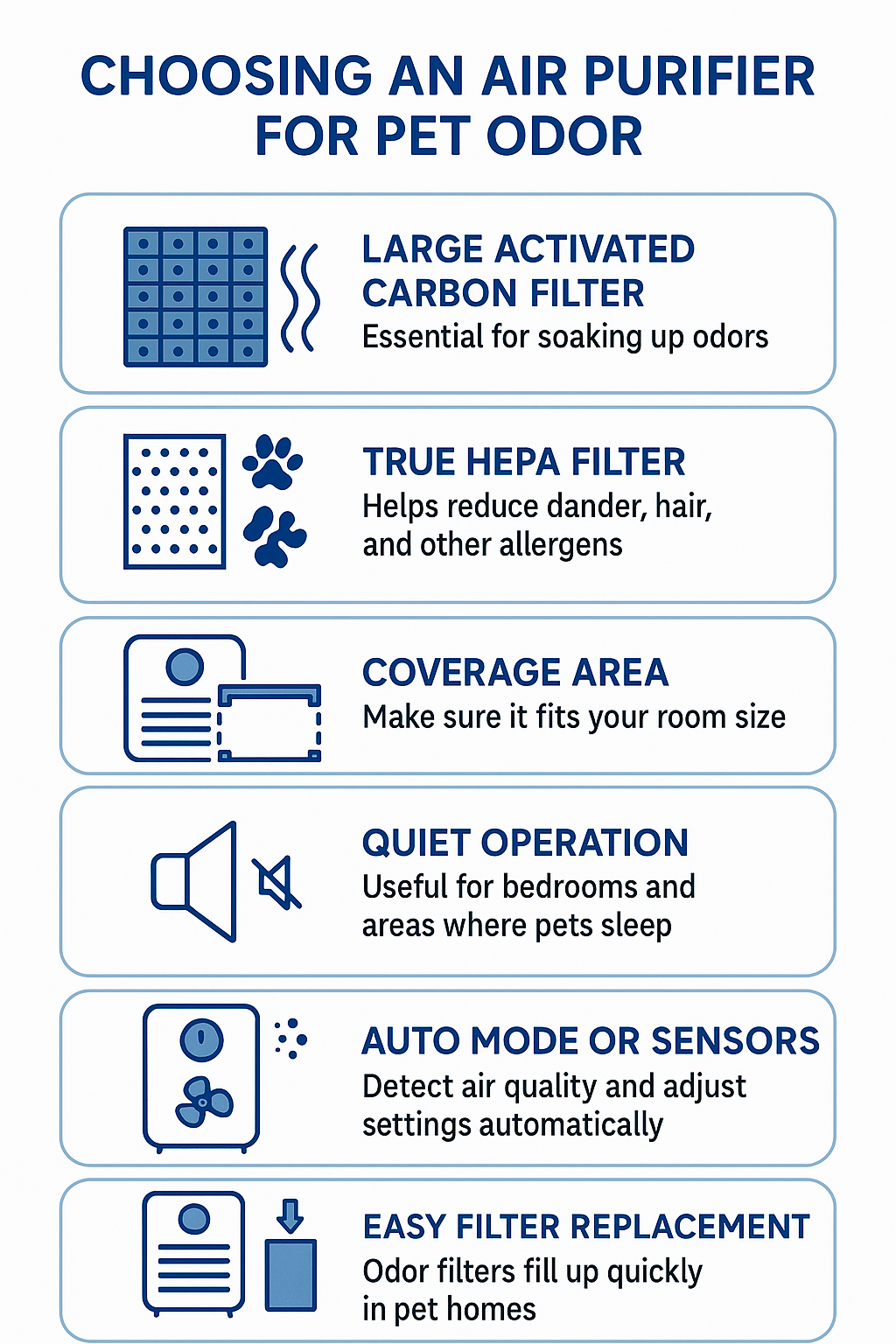Do Air Purifiers Help With Pet Odor? Tips, Facts & Limits
If you have pets, you know how much joy they bring—and how stubborn their smells can be. Wet dog, litter box, or just that lingering “pet smell” in the air, it can be tough to keep your home smelling fresh. Many pet owners ask: Do air purifiers really help with pet odor? In this blog, we break down how air purifiers work, what causes pet odors, and how to choose the right one for a fresher, cleaner home.
How Do Air Purifiers Help With Pet Odors?
Air purifiers work by pulling air through filters that trap particles and neutralize smells. The most effective purifiers for pet odors often include:
- HEPA Filters: These trap pet dander, hair, dust, and other airborne particles.
- Activated Carbon Filters: These are the key components for removing odors. They absorb volatile organic compounds (VOCs), pet urine smells, and other lingering odors.
- Ionizers: These release negatively charged ions that help neutralize some airborne particles and can aid in odor control (though not all users prefer them).
For removing strong pet odors, especially from litter boxes or accidents, the activated carbon filter is your best friend.
Air purifiers with both a True HEPA filter and a large activated carbon layer offer the best results for pet owners.
What Causes Pet Odors in the Home?
Pet smells can come from many sources:
- Pet dander: Microscopic skin flakes that shed naturally and can carry odors.
- Urine and feces: Accidents or litter boxes are common culprits.
- Wet fur: The classic “wet dog” smell that lingers after a bath or rainy walk.
- Saliva and sweat glands: Pets have scent glands in their paws and mouths.
- Pet bedding and toys: Over time, these absorb smells and release them back into the air.
Many of these odors can cling to soft surfaces like rugs, curtains, and upholstery, making them tough to eliminate without a solid air-cleaning solution.
For those with strong-smelling pets like ferrets, specialized options such as the 7 Best Air Purifiers for Ferret Odor (2025) are worth exploring.
How Air Purifiers Help with Common Pet Odor Problems
| Concern |
|---|
How Air Purifiers Help
What to Look For
Litter box or pet urine smell
Activated carbon filters trap and neutralize odor molecules
A purifier with a thick carbon filter
Wet dog or general pet smell
HEPA filters remove dander and odor-causing particles from air
HEPA + carbon combo filter system
Strong smells in closed rooms
Circulates and refreshes air, reducing lingering pet odors
High CADR rating and proper room size coverage
Pet hair and shedding issues
Pre-filters trap hair before it clogs main filters
Washable pre-filter and easy maintenance design
Do Air Purifiers Really Remove Pet Odors?
Yes, they do – but it depends on the model and filter quality. Here’s how the right purifier makes a difference:
- Captures odor particles: Carbon filters absorb gases and smells while HEPA filters catch dander and fur.
- Improves air freshness: Users often report cleaner, fresher-smelling homes within just a few days.
- Reduces allergens: Pet odors are often accompanied by allergens like fur and saliva proteins.
According to many customer reviews, air purifiers like the Levoit Core P350 or Coway AP-1512HH can dramatically reduce pet odors. If urine is a persistent issue, visit The 4 Best Air Purifiers for Pet Urine Odor of 2025.
What Features Should You Look For?

If you’re on a budget, check out The 5 Best Affordable Air Purifiers for Pet Dander of 2025 to find effective, budget-friendly options.
Real Experiences From Pet Owners
Many real-life users report that adding an air purifier made a noticeable difference. Some say the “wet dog” smell disappeared within days. Others notice less sneezing and coughing from both pets and humans.
A reviewer with two cats and a small apartment noted that their unit “completely neutralized the litter box smell within 24 hours.” Another dog owner praised the Levoit EverestAir for handling their large dog’s odors in an open-concept living room.
Have a larger space? See The 4 Best Air Purifiers for Pets in Large Rooms (2025) for top-performing models that cover more square footage.
Are Air Purifiers Enough on Their Own?
Air purifiers help a lot, but they work even better when paired with regular cleaning. Here’s what else you can do:
- Vacuum frequently with a pet-specific vacuum.
- Wash your pet’s bedding, blankets, and toys regularly.
- Clean litter boxes and potty pads daily.
- Groom your pets often to reduce shedding and dander.
If you have birds or other sensitive animals, check out The 7 Best Air Purifiers for Birds (2025) to ensure their air stays safe.
And if you’re looking for air purifiers that offer health protection beyond pet odor—like reducing airborne viruses and bacteria—see The 5 Best Air Purifiers for Bacteria and Viruses (2025).
Final Thoughts
Air purifiers aren’t just for people with allergies—they’re essential for any pet owner who wants a cleaner, fresher-smelling home. The right model can significantly reduce odors, trap allergens, and improve indoor air quality. Also, for those struggling with pet-related allergies, here’s a helpful resource: Do Air Purifiers Work for Pet Allergies?
Whether you’re dealing with strong odors, large pets, or simply want to breathe easier, there’s an air purifier out there that can help. Just be sure to choose one with strong filtration, and match it to your space and lifestyle.
By combining the power of filtration with good cleaning habits, you’ll enjoy a healthier, fresher home that both you and your pets will love.
About Author
Tayyabah Zahoor is an expert writer with a Bachelor's degree in Physics. She specializes in creating content for affiliate websites, particularly about air purifiers. Using her scientific knowledge, she compares different air purifiers by analyzing their features and effectiveness. This helps her provide clear and helpful information to consumers looking for the best options.
